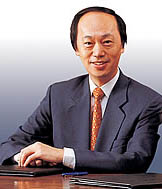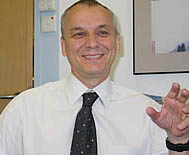CityU Gets Top Marks on Review of Teaching and Learning
Shirley Lam
Commendations on CityU's efforts and achievements include:
l A substantial shift in emphasis from teaching to learning as a guiding principle for education quality work
l Effective use of incentives and rewards for the promotion of quality in teaching and learning
l Broad discussion and subsequent action in support of whole person development
l Well-developed internship system
l Well-rounded education for research students
l High quality continuing education
l Successful staff development activities, well supported by the Education Development Office
On 31 March and 1 April, a 14-member Review Panel headed by Professor Rosie Young Tse-tse, ex-Chairman of the Education Commission, undertook the second round TLQPR of CityU. The Panel met with staff and student representatives and visited 12 of the 26 departments of the University.
Structural elements in place
The Panel acknowledged that an underlying quality assurance structure is in place and permeates the whole institution. CityU's adoption of evidence-based decision making processes in education quality work is highly commended by the Panel. The University draws on appropriate evidence, through the gathering and use of feedback from stakeholders as well as external expert review and benchmarks, to optimize learning and teaching arrangements. In addition, the Panel also recognized the effectiveness of the internal quality audit and the role of Quality Assurance Committee which help generate and foster the quality culture.
The University is also commended for making effective use of incentives and rewards to promote quality in teaching and learning, for instance, the Teaching Excellence Awards Scheme at the individual level and the Reward Scheme for Academic Departments at the departmental level.
From teaching- to learning-centred education
The Panel also noted that the University has made a substantial shift in emphasis from teaching to learning as a guiding emphasis for education quality work. Since the first TLQPR, CityU has worked to align the design of curricula with intended learning outcomes that are linked to the requirements of the world of work. The University's efforts in facilitating "ideal graduates" and "whole person development", which are accompanied by broad discussion and action in the form of well-developed co-curriculum programme, received favourable comments from the Panel. Curriculum elements that emphasize out-of-classroom learning experiences such as work attachments, internships, co-operative education arrangements and student exchanges are acknowledged.
It is also very encouraging for the University as its efforts in ensuring the full alignment between student assessment methods with intended learning outcomes are noted by the Panel. Examples of these efforts include a shift toward the assessment of a broader range of student learning outcomes and a shift away from end of course examinations to more continuous assessment that draws on a range of specific assessment methods.
A broader agenda than quality assurance
The second round of TLQPR reviewed the whole range of education quality work including the education of research students and continuing education. The Panel commended the University for establishing an integrated management structure for research postgraduate studies which works effectively. The framework for the monitoring, support and assessment of students also won high praises. For example, the Qualifying Panel, which monitors student's progress, gives students more support and contributes to the collegiality among staff members, the close attention paid to the design of curricula, constructing for students individualized programmes, and the wide ranging teaching and learning methods.
The School of Continuing and Professional Education (SCOPE)'s conscientious move in promoting a quality culture also received commendations. "It has established its own quality assurance system that is located within and extends the CityU framework," said the Panel.
Keeping the momentum
"While CityU's direction and efforts in quality culture building are recognized, it is important that we keep the momentum and strive for improvement," said Professor Ko. Upon the framework we have established, he continued, we will further consolidate our efforts for enhancement, for example, extending the internal quality audit to non-academic departments, launching the "assessment for learning" campaign to stimulate discussion among staff and students on the importance of assessment in promoting learning, continuing to facilitate communication between central management and faculties to ensure that while respecting their autonomy, the University also respects them as local quality assurance holders.
The TLQPR is a programme of quality process reviews launched by UGC. It aims to focus attention on teaching and learning, to assist institutions in their efforts to improve teaching and learning quality, and to enable the UGC and the institutions to maintain accountability for quality. "The review encouraged universities to reflect on their work in a way that has pushed forward basic ideas about higher education in


